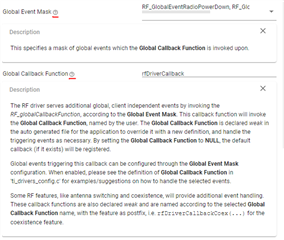Other Parts Discussed in Thread: SYSCONFIG
Dear TI Expert,
I am new to Simplelink RF Driver programming, forgive me if I am asking stupid questions. In the example project of rfCarrierWave, call back function rfDriverCallbackAntennaSwitching (...) is generated by sysconfig (bty, i cannot see the call back function name in sysconfig). I do not have a idea how does the main program enter this callback function, i mean i cannot see how a interrupt is related to this call back function as in ti_driver_config.c file.
I have read RF user guide doc, and understand events tend to occur when a command ends. So here, how can i find hints and understand the antenna switching case. (Does the event of antenna switch change the state (GPIO pin control) would call back the rfDriverCallbackAntennaSwitching function? If so , how should one usually check this prodcedure?)
Hope someone can kindly shed some light on it or share some experience on this.
Thanks in advance.
Yuanchen Zhu


